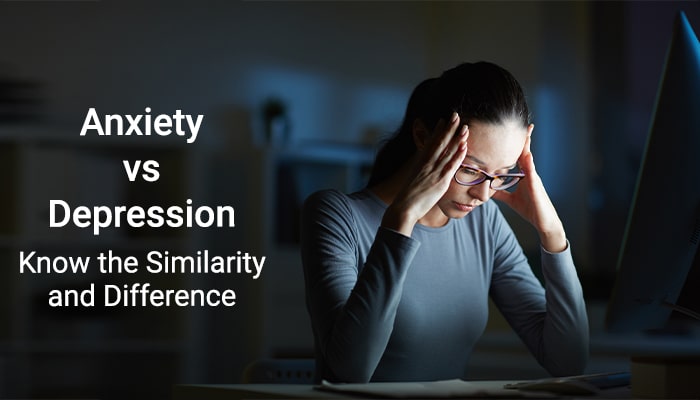Anxiety and depression are two of the most common mental health disorders that can affect people of all ages, genders, and backgrounds. While both conditions share some similarities, they are distinct from each other in terms of symptoms, causes, and treatment options. Understanding the difference between anxiety and depression is crucial for proper diagnosis and treatment. In this article, we will explore the key differences between anxiety and depression, including their symptoms, causes, and treatment options.
Anxiety: Symptoms, Causes, and Treatment
Anxiety is a normal emotional response to stress or perceived danger. It is a feeling of unease or apprehension about something that may happen in the future. Anxiety can be mild, moderate, or severe, and it can manifest in various forms, including:
- Generalized anxiety disorder (GAD): excessive, persistent worry about everyday things
- Panic disorder: sudden, intense fear or discomfort that lasts several minutes
- Social anxiety disorder: fear of social situations or performance anxiety
- Phobias: intense fear of specific objects or situations
Symptoms of anxiety may include:
- Restlessness or feeling on edge
- Fatigue
- Difficulty concentrating
- Irritability
- Muscle tension
- Sleep disturbances
- Sweating or trembling
Causes of anxiety can be genetic, environmental, or a combination of both. Some common causes of anxiety include:
- Family history of anxiety or other mental health disorders
- Exposure to stress or trauma
- Chronic medical conditions
- Substance abuse
- Side effects of medications
Treatment for anxiety may include medication, therapy, or a combination of both. Some common treatment options include:
- Antidepressant medication: medications like selective serotonin reuptake inhibitors (SSRIs) or serotonin-norepinephrine reuptake inhibitors (SNRIs) can be effective in treating anxiety disorders.
- Cognitive-behavioral therapy (CBT): therapy that focuses on changing negative thoughts and behaviors associated with anxiety.
- Exposure therapy: a type of therapy that helps individuals confront and overcome their fears and phobias.
- Relaxation techniques: practices like yoga, meditation, or deep breathing exercises can help reduce symptoms of anxiety.
Depression: Symptoms, Causes, and Treatment
Depression is a mood disorder characterized by persistent feelings of sadness, hopelessness, and loss of interest in activities that were once enjoyable. However, depression can be mild, moderate, or severe, and it can interfere with daily activities, work, and relationships. Some common types of depression include:
- Major depressive disorder (MDD): persistent feelings of sadness or a lack of interest in activities that lasts for two weeks or more
- Persistent depressive disorder (PDD): ongoing feelings of sadness and hopelessness for at least two years
- Seasonal affective disorder (SAD): depression that occurs in the winter months due to reduced sunlight
- Postpartum depression: depression that occurs after childbirth
Symptoms of depression may include:
- Persistent sadness or feeling empty
- Loss of interest in activities once enjoyed
- Difficulty sleeping or oversleeping
- Changes in appetite and weight
- Fatigue or low energy
- Feelings of worthlessness or guilt
- Difficulty concentrating or making decisions
- Thoughts of death or suicide
Causes of depression can be genetic, environmental, or a combination of both. Some common causes of depression include:
- Family history of depression or other mental health disorders
- Exposure to stress or trauma
- Chronic medical conditions
- Substance abuse
- Hormonal changes (in the case of postpartum depression)
Treatment for depression may include medication, therapy, or a combination of both. Some common treatment options includes:
- Antidepressant medication: medications like SSRIs, SNRIs, or tricyclic antidepressants (TCAs) can be effective in treating depression.
- Cognitive-behavioral therapy (CBT): therapy that focuses on changing negative thoughts and behaviors associated with depression.
- Interpersonal therapy (IPT): therapy that focuses on improving relationships and social support.
- Electroconvulsive therapy (ECT): a treatment that uses electrical stimulation to the brain to improve mood.
Difference between Anxiety and Depression
While anxiety and depression share some symptoms, such as fatigue, difficulty concentrating, and sleep disturbances, there are some key differences between the two disorders.
- Emotions: Anxiety is characterized by feelings of worry, fear, or apprehension about future events, while depression is characterized by feelings of sadness, hopelessness, and despair.
- Duration: Anxiety can be short-lived and triggered by a specific event, while depression is a persistent condition that can last for weeks, months, or even years.
- Causes: Anxiety can be triggered by stress, trauma, or a specific phobia, while depression can be caused by a combination of genetic, environmental, and biological factors.
- Treatment: While there is some overlap in treatment options for anxiety and depression, medication and therapy can be tailored to the specific disorder and symptoms. For example, exposure therapy may be more effective for anxiety disorders, while IPT may be more effective for depression.
Bottom Lines For Difference Between Anxiety and Depression
Anxiety and depression are two distinct mental health disorders that can have a significant impact on an individual’s quality of life. Understanding the difference between anxiety and depression can help individuals and healthcare providers make a proper diagnosis and develop an effective treatment plan. While both conditions can be treated with medication and therapy, it is important to tailor treatment to the specific disorder and symptoms. If you or someone you know is experiencing symptoms of anxiety or depression, seek professional help to develop a personalized treatment plan.
Read Also:
Heart Issues Due To Stress: Everything You Need To Know
Dry Mouth Anxiety: Causes, Symptoms, And Treatment
Meditation For Weight Loss: Meditation Benefits
Avocado Allergy: Symptoms, Diagnosis, And Management
Drinks To Boost Immune System
Related



